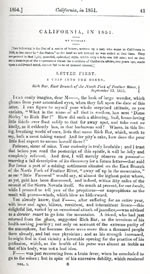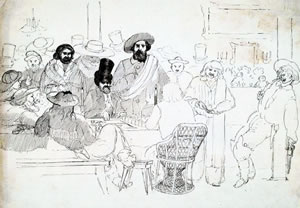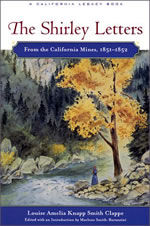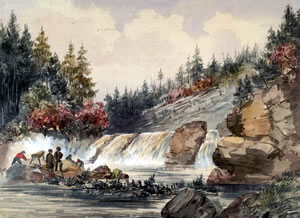From The Shirley Letters, “Letter of January 27, 1852”
Dame Shirley (Louise Clapp)
 One of the most remarkable documents of the California Gold Rush era was a series of letters written by a young woman who signed them “Dame Shirley.” Describing life in the rude mining camps of Indian Bar and Rich Bar along the Feather River, these letters are fascinating, lively accounts of the time period. “Dame Shirley” was Louise Amelia Knapp Smith Clapp. She had accompanied her husband Dr. Fayette Clapp westward in the heady early days of the Gold Rush. The famous author Bret Harte, who may or may not have utilized Clapp’s descriptions in writing his own manuscripts, knew her accounts. Clapp generously referred to Harte’s possible usage of her descriptions as “Unconscious Plagiarisms.”
One of the most remarkable documents of the California Gold Rush era was a series of letters written by a young woman who signed them “Dame Shirley.” Describing life in the rude mining camps of Indian Bar and Rich Bar along the Feather River, these letters are fascinating, lively accounts of the time period. “Dame Shirley” was Louise Amelia Knapp Smith Clapp. She had accompanied her husband Dr. Fayette Clapp westward in the heady early days of the Gold Rush. The famous author Bret Harte, who may or may not have utilized Clapp’s descriptions in writing his own manuscripts, knew her accounts. Clapp generously referred to Harte’s possible usage of her descriptions as “Unconscious Plagiarisms.”
In this letter from January 27, 1852, Dame Shirley describes a memorable Christmas celebration.
From our Log Cabin, Indian Bar, January 27, 1852

I wish that it were possible, dear M., to give you an idea of the perfect saturnalia which has been held upon the river for the last three weeks, without at the same time causing you to think too severely of our good mountains. In truth, it requires not only a large intellect, but a large heart, to judge with becoming charity of the peculiar temptations of riches. A more generous, hospitable, intelligent, and industrious people than the inhabitants of the half-dozen bars, of which Rich Bar is the nucleus, never existed; for you know how proverbially wearing it is to the nerves of manhood to be entirely without either occupation or amusement, and that has been pre-eminently the case during the present month.
Imagine a company of enterprising and excitable young men, settled upon a sandy level about as large as a poor widow’s potato-patch, walled in by sky-kissing hills, absolutely compelled to remain on account of the weather, which has vetoed indefinitely their exodus, with no place to ride or drive even if they had the necessary vehicles and quadrupeds; with no newspapers nor politics to interest them; deprived of all books but a few dog-eared novels of the poorest class, —churches, lectures, lyceums, theaters, and (most unkindest cut of all!) pretty girls, having become to these unhappy men mere myths; without one of the thousand ways of passing time peculiar to civilization, most of them living in damp, gloomy cabins, where heaven’s dear light can enter only by the door; and when you add to all these disagreeables the fact that, during the never-to-be-forgotten month, the most remorseless, persevering rain which ever set itself to work to drive humanity mad has been pouring doggedly down, sweeping away bridges, lying in uncomfortable puddles about nearly all of the habitations, wickedly insinuating itself beneath un-umbrella-protected shirt-collars, generously treating to a shower-bath and the rheumatism sleeping bipeds who did not happen to have an india-rubber blanket, and, to crown all, rendering mining utterly impossible, —you cannot wonder that even the most moral should have become somewhat reckless.
Saturnalia Commences
The saturnalia commenced on Christmas evening, at the Humboldt, which, on that very day, had passed into the hands of new proprietors. The most gorgeous preparations were made for celebrating the two events. The bar was retrimmed with red calico, the bowling-alley had a new lining of the coarsest and whitest cotton cloth, and the broken lamp-shades were replaced by whole ones. All day long, patient mules could be seen descending the hill, bending beneath casks of brandy and baskets of champagne, and, for the first time in the history of that celebrated building, the floor (wonderful to relate, it has a floor) was washed, at a lavish expenditure of some fifty pails of water, the using up of one entire broom, and the melting away of sundry bars of the best yellow soap, after which I am told that the enterprising and benevolent individuals who had undertaken the herculean task succeeded in washing the boards through the hopeless load of dirt which had accumulated upon them during the summer and autumn. All these interesting particulars were communicated to me by Ned when he brought up dinner. That distinguished individual himself was in his element, and in a most intense state of perspiration and excitement at the same time.
Darkness Falls
About dark we were startled by the loudest hurrahs, which arose at the sight of an army of indiarubber coats (the rain was falling in riverfuls), each one enshrouding a Rich Barian, which was rapidly descending the hill. This troop was headed by the “General,” who, lucky man that he is, waved on high, instead of a banner, a live lantern, actually composed of tin and window-glass, and evidently intended by its maker to act in no capacity but that of a lantern. The General is the largest and tallest, and with one exception I think the oldest, man upon the river. He is about fifty, I should fancy, and wears a snow-white beard of such immense dimensions, in both length and thickness, that any elderly Turk would expire with envy at the mere sight of it. Don’t imagine that he is a reveler. By no means. The gay crowd followed him, for the same reason that the king followed Madam Blaize,—because she went before. At nine o’clock in the evening they had an oyster-and-champagne supper in the Humboldt, which was very gay with toasts, songs, speeches, etc.  I believe that the company danced all night; at any rate, they were dancing when I went to sleep, and they were dancing when I woke the next morning. The revel was kept up in this mad way for three days, growing wilder every hour. Some never slept at all during that time. On the fourth day they got past dancing, and, lying in drunken heaps about the barroom, commenced a most unearthly howling. Some barked like dogs, some roared like bulls, and others hissed like serpents and geese. Many were too far gone to imitate anything but their own animalized selves. The scene, from the description I have had of it, must have been a complete illustration of the fable of Circe and her fearful transformations. Some of these bacchanals were among the most respectable and respected men upon the river. Many of them had resided here for more than a year, and had never been seen intoxicated before. It seemed as if they were seized with a reckless mania for pouring down liquor, which, as I said above, everything conspired to foster and increase.
I believe that the company danced all night; at any rate, they were dancing when I went to sleep, and they were dancing when I woke the next morning. The revel was kept up in this mad way for three days, growing wilder every hour. Some never slept at all during that time. On the fourth day they got past dancing, and, lying in drunken heaps about the barroom, commenced a most unearthly howling. Some barked like dogs, some roared like bulls, and others hissed like serpents and geese. Many were too far gone to imitate anything but their own animalized selves. The scene, from the description I have had of it, must have been a complete illustration of the fable of Circe and her fearful transformations. Some of these bacchanals were among the most respectable and respected men upon the river. Many of them had resided here for more than a year, and had never been seen intoxicated before. It seemed as if they were seized with a reckless mania for pouring down liquor, which, as I said above, everything conspired to foster and increase.
Of course there were some who kept themselves aloof from these excesses, but they were few, and were not allowed to enjoy their sobriety in peace. The revelers formed themselves into a mock vigilance committee, and when one of these unfortunates appeared outside, a constable, followed by those who were able to keep their legs, brought him before the court, where he was tried on some amusing charge, and invariably sentenced to “treat the crowd.” The prisoners had generally the good sense to submit cheerfully to their fate.
New Year's Day
Towards the latter part of the week, people were compelled to be a little more quiet, from sheer exhaustion, but on New Year’s Day, when there was a grand dinner at Rich Bar, the excitement broke out, if possible, worse than ever. The same scenes, in a more or less aggravated form, in proportion as the strength of the actors held out, were repeated at Smith’s Bar and The Junction.
Nearly every day I was dreadfully frightened by seeing a boat-load of intoxicated men fall into the river, where nothing but the fact of their being intoxicated saved many of them from drowning. One morning about thirty dollars’ worth of bread (it must have been tipsy-cake), which the baker was conveying to Smith’s Bar, fell overboard, and sailed merrily away towards Marysville. People passed the river in a boat, which was managed by a pulley and a rope that was strained across it from Indian Bar to the opposite shore.

Of the many acquaintances who had been in the habit of calling nearly every evening, three, only, appeared in the cabin during as many weeks. Now, however, the saturnalia is about over. Ned and Chock have nearly fiddled themselves into their respective graves, the claret (a favorite wine with miners) and oysters are exhausted, brandied fruits are rarely seen, and even port-wine is beginning to look scarce. Old callers occasionally drop in, looking dreadfully sheepish and subdued, and so sorry, and people are evidently arousing themselves from the bacchanal madness into which they were so suddenly and so strangely drawn.
